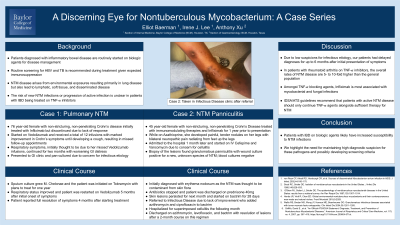Sunday Poster Session
Category: IBD
P0815 - A Discerning Eye for Nontuberculous Mycobacterium: A Case Series
Sunday, October 22, 2023
3:30 PM - 7:00 PM PT
Location: Exhibit Hall

Has Audio

Elliot A. Baerman, MD
Baylor College of Medicine
Houston, TX
Presenting Author(s)
Elliot A. Baerman, MD, Irene Lee, MD, Anthony Xu, MD
Baylor College of Medicine, Houston, TX
Introduction: Patients diagnosed with inflammatory bowel disease are routinely started on biologic agents for disease management. These agents are known to create an immunosuppressed state and require regular testing for infections such as HBV and TB. However, not much is known about susceptibility to nontuberculous mycobacterium infections in this population. We present two cases of NTM infections in patients started on biologics for IBD. Our patients recovered with adequate treatment but had delayed diagnoses months after initial presentation of symptoms due to low suspicion for an infectious etiology upon ruling out more common pathogens.
Case Description/Methods: Our first patient is a 45 year-old female with non-stricturing, non-penetrating Crohn’s Disease treated with immunomodulating therapies and Infliximab from 2014 to 2015. In 2016, she was admitted for cellulitis due to a 3 month history of lower extremity lesions. Biopsy of the lesions found granulomatous panniculitis with wound culture positive for a new, unknown species of NTM. She was later referred to ID due to lack of improvement with conservative treatment and started on Azithromycin, Levofloxacin, and TMP-SMX with resolution of symptoms.
The second patient is a 76 year-old female with non-stricturing, non-penetrating Crohn’s disease diagnosed in 2012 initially treated with Infliximab but discontinued due to lack of response. In 2015, she was started on Vedolizumab with marked improvement in Crohn’s symptoms until developing a cough, resulting in missed infusion sessions. The patient had continued symptoms for two months, thought to be secondary to her missed Vedolizumab infusions, until she was diagnosed with M. Chelonae pneumonia. She was treated with Tobramycin with eventual resolution of symptoms.
Discussion: Generally, disease from NTM is thought to be due to environmental exposures resulting primarily in lung disease; however, cases of lymphatic, soft tissue, and disseminated disease have also been reported. In a study of patients with rheumatoid arthritis on anti-TNF therapy, the overall rates of NTM disease were 5- to 10-fold higher than the general population. Of note, NTM infections were more common and resulted in more deaths than TB infections in the study. The current literature and our cases highlight that patients on biologic agents likely have increased susceptibility to NTM infections and the importance of incorporating screening criteria and maintaining high diagnostic suspicion for these pathogens.
Disclosures:
Elliot A. Baerman, MD, Irene Lee, MD, Anthony Xu, MD. P0815 - A Discerning Eye for Nontuberculous Mycobacterium: A Case Series, ACG 2023 Annual Scientific Meeting Abstracts. Vancouver, BC, Canada: American College of Gastroenterology.
Baylor College of Medicine, Houston, TX
Introduction: Patients diagnosed with inflammatory bowel disease are routinely started on biologic agents for disease management. These agents are known to create an immunosuppressed state and require regular testing for infections such as HBV and TB. However, not much is known about susceptibility to nontuberculous mycobacterium infections in this population. We present two cases of NTM infections in patients started on biologics for IBD. Our patients recovered with adequate treatment but had delayed diagnoses months after initial presentation of symptoms due to low suspicion for an infectious etiology upon ruling out more common pathogens.
Case Description/Methods: Our first patient is a 45 year-old female with non-stricturing, non-penetrating Crohn’s Disease treated with immunomodulating therapies and Infliximab from 2014 to 2015. In 2016, she was admitted for cellulitis due to a 3 month history of lower extremity lesions. Biopsy of the lesions found granulomatous panniculitis with wound culture positive for a new, unknown species of NTM. She was later referred to ID due to lack of improvement with conservative treatment and started on Azithromycin, Levofloxacin, and TMP-SMX with resolution of symptoms.
The second patient is a 76 year-old female with non-stricturing, non-penetrating Crohn’s disease diagnosed in 2012 initially treated with Infliximab but discontinued due to lack of response. In 2015, she was started on Vedolizumab with marked improvement in Crohn’s symptoms until developing a cough, resulting in missed infusion sessions. The patient had continued symptoms for two months, thought to be secondary to her missed Vedolizumab infusions, until she was diagnosed with M. Chelonae pneumonia. She was treated with Tobramycin with eventual resolution of symptoms.
Discussion: Generally, disease from NTM is thought to be due to environmental exposures resulting primarily in lung disease; however, cases of lymphatic, soft tissue, and disseminated disease have also been reported. In a study of patients with rheumatoid arthritis on anti-TNF therapy, the overall rates of NTM disease were 5- to 10-fold higher than the general population. Of note, NTM infections were more common and resulted in more deaths than TB infections in the study. The current literature and our cases highlight that patients on biologic agents likely have increased susceptibility to NTM infections and the importance of incorporating screening criteria and maintaining high diagnostic suspicion for these pathogens.
Disclosures:
Elliot Baerman indicated no relevant financial relationships.
Irene Lee indicated no relevant financial relationships.
Anthony Xu indicated no relevant financial relationships.
Elliot A. Baerman, MD, Irene Lee, MD, Anthony Xu, MD. P0815 - A Discerning Eye for Nontuberculous Mycobacterium: A Case Series, ACG 2023 Annual Scientific Meeting Abstracts. Vancouver, BC, Canada: American College of Gastroenterology.
